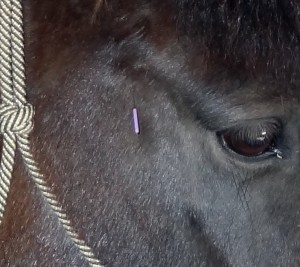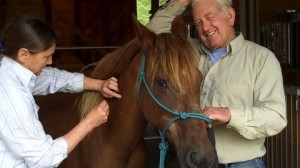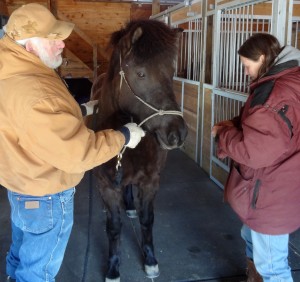Breaking down the mystique,  reviewing the science
reviewing the science
By Maddy Butcher
It was not a Kodak moment for acupuncture.
Dr. Cynthia Reynolds was working at an Arizona racetrack in the late 1990’s. She watched as a colleague tried treating a colicking horse with acupuncture, inserting thin needles through his skin.
“The horse just dropped,” recalled Reynolds. “He got dramatically worse.”
Reynolds saw first-hand the impact this traditional Chinese treatment can have on a horse. The incident helped propel her on an educational journey that has ultimately led her to becoming the most prominent veterinarian acupuncturist in Maine. (Thankfully, the horse fully recovered.)
At Thanksgiving Farm in Durham, Maine, the horses have benefitted from Reynold’s treatment for years:
“Her visits are not only welcomed by us, but by our animals,” said owner Barbara Stanley. “They do not react to her with fear, but with curiosity and anticipation. They seem to recognize Vet Cindy as the one that makes them feel better, which certainly gives us all peace of mind.”
Just as feng shui has worked its way into design, so too has acupuncture grown from its Chinese roots into the equine veterinary
world. Most of us horseowners don’t really understand the concept, but if it can make our horses feel better, why not go with it?
Feng shui and acupuncture both address Qi, pronounced ‘chee.’ Translated literally from Mandarin Chinese, Qi means ‘air’ or ‘breath.’ But it is more accurately defined as a life force or energy flow.
When flow is disrupted, imbalances develop and the body becomes compromised. Acupuncture seeks to restore proper flow; needles help free up blockages.
I spoke with Dr. Reynolds and Dr. Matt Randall, who lectured at the Alberta Horse Breeders & Owners Conference.
Acupuncture is best used to treat chronic pain, lameness, and allergies, they told me. Where Randall practices in Texas, it’s also has been effective in treating anhidrosis (an inability to sweat) and heaves.
Many practitioners, including Reynolds and Randall, often use it in conjunction with chiropractic treatment.
It works. But how?
How do Western-trained scientists design a research project using the scientific method to test and quantify such a mystical energy?
It seems a bit like asking a Grand Prix rider to go rope some cattle where his ingrained skills and perspective might make the task more challenging than if he was starting with no skills or viewpoint at all.
It’s a bit like quantifying a horseman’s ‘feel’ with units of measurement like seconds and ounces.
Some vets, including Dr. David Ramey, have suggested that horses get similarly positive results from placebo acupuncture.
Indeed, said Randall, many experiments have produced unconvincing results because researchers have poorly defined a proper placebo or control group.
- Would horses in the control group get no needles?
- Would they get needles placed away from Qi pathways?
- Randomly-placed needles?

Reynolds treats Honey, a horse at Thanksgiving Farm in Durham, Maine. Reynolds’ husband, Elijah Moore, assists.
Those needles may still end up near acupoints and end up eliciting a response, said Randall.
The University of Florida’s Dr. Huisheng Xie and colleagues have done the bulk of research quantifying acupuncture’s effects. In an experiment which echos what Reynolds saw on the Arizona track, researchers have shown that colic can be induced through acupuncture. (Yes, horses get colic and mice get cancer. All in the name of science!)
A more beneficent project has shown that more of the body’s natural pain killers (endorphins, serotonin, norephinephrine, and gamma-aminobutyric acid) are released when acupuncture needles are effectively placed.
While the research may be equivocal, anecdotal evidence is quite positive.
“The licking and chewing is our key that we’ve done something that’s making the horse feel better,” said Randall.
Acupuncture helps by reducing the amount of medication, including artificial painkillers and steroids, and by reducing lameness, he added.
“Horses are better quicker.”
Considering scientists’ fixed parameters, it seems likely that researchers may be looking at acupuncture from the wrong angle. Future experiments might yield more conclusive results if new perspectives and different measurements were observed.
Our traditional Western work-up, for instance, yields a physical exam, blood work, biochemistry, x-rays, etc. By all these measurements, a given horse might be fine.
But given the traditional Chinese evaluation, that same “well” horse might reveal pathologies.
Randall advocates both Western and Eastern medicine. “Using the two modalities will get you better results. They’re synergistic. They work better together than either by themselves,” he said.
To Note:
Randall and Reynolds cautioned clients when NOT to treat with acupuncture:
Pregnant mares
Horses with cancer (“You don’t want to give tumors energy,” said Randall.
And at certain times when steroids are in use, since steroids suppress the immune system and needles may infrequently introduce infection.
Reynolds always relies on an experienced handler to assist during treatment. In most cases, it’s her husband, Elijah Moore. “I’d much prefer having him there for safety. That way I’m confident about who’s handling the horse. He’s a big asset,” she said.
